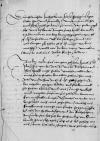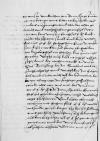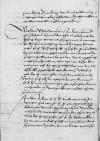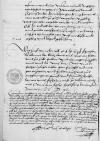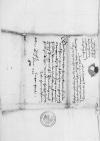Letter #5233
Ioannes DANTISCUS to Albrecht I von Hohenzollern-AnsbachHeilsberg (Lidzbark), 1540-01-31
English register:
Dantiscus received two letters from the addressee. In his reply he refers to Duke Albrecht’s decrees/edicts/regulations concerning the export of goods from Ducal Prussia to the diocese of Ermland and other issues related to the local trade. He informs the Duke about his own ordinances on trading i.a. in hop and flax. He is concerned about the information from the Bishop of Sambia [Georg Polentz] on impediments/obstacles to trade experienced by local peasants and would also like to see the change of market day in Heiligenbeil (Święta Siekierka) and Zinten (Cynty).
The day before Achatius von Zehmen, Castellan of Gdańsk (Danzig) left Dantiscus. Dantiscus discusses Castellan’s conflict with his adversary/opponent [Stanisław Kostka] and sends the addressee a letter by/from von Zehmen, asking for it to be returned after reading it.
He thanks Albrecht for the assurances of friendship. He also mentions the Danish case/matter/issue.
In the Latin postscript, Dantiscus notes that, after a two-year hiatus in their correspondence, Cornelis de Schepper has written to him from Brussels. However, De Schepper does not address the Danish matter. Instead, he mentions the riots in Flanders and notes that the King of the Romans, Ferdinand I of Habsburg, plans to meet Emperor Charles V to discuss matters of faith. De Schepper anticipates that the King of Poland, Sigismund I Jagiellon, will be asked to send an envoy to this meeting and encourages Dantiscus to accept if he is chosen for this mission. Nevertheless, Dantiscus hesitates to return to the hardships of serving as an envoy.
| received 1540-02-02 Manuscript sources:
Auxiliary sources:
Prints:
| ||||||||||||
Text & apparatus & commentary Plain text Text & commentary Text & apparatus Excerpts concerning Dantiscus' travels
 GStA PK, HBA, C1 No 628 6v
Dem durchlauchten, hochgebornen fursten unnd herrn, hern
GStA PK, HBA, C1 No 628 6v
Dem durchlauchten, hochgebornen fursten unnd herrn, hern
In f(urstlicher) ... illegible⌈...... illegible⌉ [...] paper damaged⌈[...][...] paper damaged⌉t[1] eigen hant /
 GStA PK, HBA, C. 1, No. 628, f. 1r
GStA PK, HBA, C. 1, No. 628, f. 1r
Durchlaucher, hochgeborner furst, hochgunstiger, lieber herr unnd freundt. / Unnsern freuntlichen unnd fleyswyllige dienst zuvoran. /
Wir haben negst bey unnserm kamer jungen zwey briffe, / den cf.
Inn dem cf.  GStA PK, HBA, C. 1, No. 628, f. 1v an unnser
GStA PK, HBA, C. 1, No. 628, f. 1v an unnser  GStA PK, HBA, C. 1, No. 628, f. 2r freundtlich zuverdinen / unnd mit gutter nutzlicher zuneigung derselbten unnderthan allenthalbenn wollen lossenn genissenn. /
GStA PK, HBA, C. 1, No. 628, f. 2r freundtlich zuverdinen / unnd mit gutter nutzlicher zuneigung derselbten unnderthan allenthalbenn wollen lossenn genissenn. /
Was denn edlen unnsern sonnderen freundt, herr(n)
Inn dem andren E(wer) f(urstlichen) D(urchlauch)t cf.  GStA PK, HBA, C. 1, No. 628, f. 2v erfarenn / unnd aus unserm munde in gegenwertigheit angehort. / Wer ouch vil danncksagung in der dennischen handlung, / die wir etwan uns allen zu guth vorgestelt, / unnotig. / Was wir aber weytter wusten unnd mochten E(wer) f(urstlichen) D(urchlauch)t und all der verwanten / zu ehren, / nutz unnd gutter wolfhart / ausrichtenn / und wirglich zw thun, / erbitt wir uns ane boschwerde wyllig unnd mit on the margin⌈mitmit on the margin⌉ begird geflissenn. /
GStA PK, HBA, C. 1, No. 628, f. 2v erfarenn / unnd aus unserm munde in gegenwertigheit angehort. / Wer ouch vil danncksagung in der dennischen handlung, / die wir etwan uns allen zu guth vorgestelt, / unnotig. / Was wir aber weytter wusten unnd mochten E(wer) f(urstlichen) D(urchlauch)t und all der verwanten / zu ehren, / nutz unnd gutter wolfhart / ausrichtenn / und wirglich zw thun, / erbitt wir uns ane boschwerde wyllig unnd mit on the margin⌈mitmit on the margin⌉ begird geflissenn. /
Was sunst von noten uff E(wer) f(urstlichen) D(urchlauch)t letzst schreyben, / ist oben mit der kurtz beantwurt, / das wir bitten unns zw gutte halten / unnd derwegen sich ghen unns unnd die unnsern, / wie unnser hochgunstiger, lieber herr freun written over ...⌈... illegible⌈...... illegible⌉nn written over ...⌉dt und nachpar erzegenn unnd halten, / auch uns aus angefanngener gunst / unnd freundtschafft, / der wir unns befhelenn nicht zu lossenn. /
Dat(um) aus unnserm schlos
Postscript:
Illustrissimae Dominationis Vestrae deditissimus
